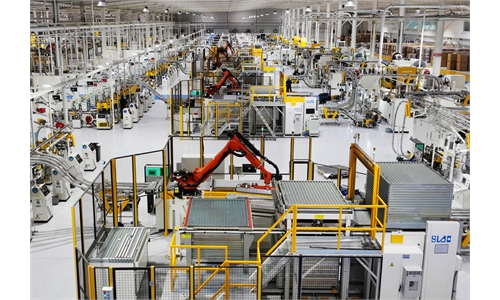
Photo: VCG
China will ratchet up efforts to develop emerging industries and industries of the future, so as to strive to seize the high ground in global industrial competition, said Jin Zhuanglong, head of the Ministry of Industry and Information Technology (MIIT).Jin's remarks were made in an interview with the People's Daily published on Wednesday, clarifying that there are four major targets for the MIIT in 2024: accelerate the transformation and upgrading of traditional industries; consolidate and improve the leading position of advantageous industries; actively foster emerging industries and industries of the future, and promote new industrialization enabled by artificial intelligence (AI).
"As strategic emerging industries account for 13 percent of China's GDP, one of the key priorities for 2024 is the effort to actively develop new productive forces," Jin said.
Analysts said that in a critical period of the global technological revolution and industrial transformation, China, with its vast market, abundant resources, and strong research and (R&D) capabilities, has the opportunity to take a leading position in this process.
To realize the targets, the MIIT will draw up the policy paper to promote the R&D and application of cutting-edge technologies such as AI, humanoid robots, the metaverse, next-generation internet, 6G and quantum information.
"AI is a strategic technology that will lead the new round of scientific and technological revolution and industrial transformation. AI has already been used in R&D, design and manufacturing, and has become an important driving force for new industrialization," the minister said.
Jin highlighted the application of large generative AI models in manufacturing, saying that the in-depth integration of AI and manufacturing will foster a sound innovation ecosystem in the country.
Jin said that China's industrial development has made significant progress, but still faces numerous difficulties and obstacles. However, there are increasingly favorable conditions for pursuing sustained development.
China has built the world's largest and most technologically advanced information and communication network, ranking second in terms of computing power, with R&D in 6G, quantum communication and other cutting-edge technologies in the world-leading position, said Jin.
Meanwhile, China is now the world's largest and most active digital consumer market, integrating industrial Internet applications into 49 national economic sectors.
In recent years, China has made significant progress in the fields of AI, 5G, quantum computing and more industries of the future, Wang Peng, an associate researcher from the Beijing Academy of Social Sciences, told the Global Times on Wednesday.
"The technological advancement of AI has not only promoted academic research in relevant fields, but also facilitated industrial applications," said Wang.
China's registered AI-related companies totaled 1.57 million in 2023, data from a Chinese information provider Qichacha.com revealed.
"With the continuous development of technology, traditional industries are undergoing profound changes. For example, new models such as intelligent manufacturing and smart agriculture are gradually replacing traditional ones, improving production efficiency and resource utilization," Wang said.
Jin highlighted the need to implement smart manufacturing projects and vigorously develop smart products and equipment, smart factories, and smart supply chains.
To encourage and support the development of AI, the Chinese government has committed to providing a favorable market environment and proposed several AI-related regulations.
For example, in April 2023, the country's top policymakers held a meeting emphasizing the importance of developing generative AI models, creating an innovative ecosystem and focusing on risk prevention.
With the continuous development and improvement of large generative model technology, it will become an important driving force for the industrialization, promoting the transformation and upgrading of traditional industries toward digitization and intelligence, said analysts.
There are at least 130 Chinese companies conducting research on large generative AI model products, according to the Xinhua News Agency.



